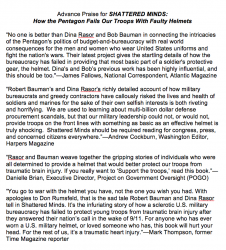Sold: “SHATTERED MINDS: How the Pentagon Fails Our Troops with Faulty Helmets” by Robert Bauman and Dina Rasor
/1 Comment/in Book Biz, Philip Turner Book Productions, Philip Turner's Books & Writing /by Philip TurnerI first blogged about SHATTERED MINDS: How the Pentagon Fails Our Troops with Faulty Helmets in 2016, linking it to a Washington Post story by Ben Guarino about an amazingly hard material found in nature:
Authors Robert Bauman and Dina Rasor were still working on their manuscript in 2016, and I was preparing to begin submitting the project to publishers. There’s an unusual backstory to the book, which I’ll outline below.
In 2008, when I was acquiring books as Editorial Director at Union Square Press, I read a stunning NY Times story about two whistleblowers at a defense contractor in North Dakota who at great personal risk revealed that their employer was knowingly shorting the amount of the protective material Kevlar in the combat helmets they were fabricating for the Pentagon, to increase their profits at the expense of troop safety. At the suggestion of Paul Rieckhoff, founder of Iraq and Afghanistan Veterans of America. I commissioned a book on this grotesque boondoggle to be written by two ace reporters on military procurement and the Pentagon, Dina Rasor and Robert Bauman. In 2009, while they were working on the manuscript, and discovering yet another brave whistleblower to include in the narrative, I left that job and parent company Sterling Publishing canceled the contract, handing the rights back to the authors. Fast forward several years and Bob and Dina approached me to see if in my new role as an agent I would be game to try to help them re-sell the book to a new publisher, which I agreed to, with generous approval from their original agent Bonnie Nadell. This is exactly the type of “imperative nonfiction” I have long cultivated as a publishing professional, and I was very excited to accept the challenge of reselling it to a new publisher. This was part of my pitch letter to publishers:
This revelatory book, written by two authors who’ve covered the Pentagon for many years, reports that in the twenty-first century, while traumatic brain injury (TBI) has become the signature injury suffered by our troops, the defense establishment has failed US fighting men and women by continuing to issue them an antiquated military helmet that fails to mitigate the worst of this tragic harm, even though superior design and technology are increasingly available. This investigation by Dina Rasor and Robert Bauman, the first book to examine this most basic item of military equipment, features the stories of two sets of whistleblowers determined to expose the truth about the failures of the military helmet bureaucracy. Their book braids together the two stories of two sets of whistleblowers to chronicle the helmet scandal and its human impact.
Indeed, in 2017 I sold the book to Potomac Books, a military and public affairs imprint at the University of Nebraska Press, as documented in the deal report below posted at the book industry site publishersmarketplace[dot]com.
Potomac has scheduled the book for publication in March 2019. I’ll post a cover when they have it ready. Meantime, the authors have already received these superb endorsements:
SHATTERED MINDS will set a challenge for technologists, designers, people who use 3D printers, materials scientists, and high level defense thinkers to finally design the most protective military helmet possible. Despite the Pentagon’s failures to this point, we hope to gain their attention to bring new talent and focus to the goal of producing a superior helmet. In the same regard, we are excited about the effort being undertaken by the Head Health Challenge, which also relates to football helmets, an effort that has been covered by Liz Stinson in Wired magazine. I’m hopeful we’ll be able to forge a constructive link between the Defense Dept and the NFL, in as much as the league often cites its cooperation with the US military. I recommend you read the fascinating article by Ben Guarino, which also has video from UC Riverside scientist David Kisailus.
Sept 22 2018 Birthday Bike Ride
/0 Comments/in Art, Photography, Design, Bicycling, Urban Life & New York City /by Philip TurnerMatt Mays and Terra Lightfoot Raisin’ the Roof in Brooklyn
/0 Comments/in Canada, Music, Bands & Radio, Urban Life & New York City /by Philip TurnerMatt Mays and Terra Lightfoot played a great show at the Knitting Factory last Monday night. It was good to re-meet ace music producer Gus Van Go in the audience. I look forward to hearing him play at the same venue with his band Megative on Oct 13!
Always Glad to See Franconia College Cited in the News
/0 Comments/in Personal history, Family, Friends /by Philip TurnerSold: “The Twenty-ninth Day: Surviving a Grizzly Attack in the Canadian Tundra” by Alex Messenger
/0 Comments/in Books & Writing, Nature, Animals, Adventure, Philip Turner Book Productions, Philip Turner's Books & Writing /by Philip Turner One of the most exciting things in my work as an independent editor and literary agent is when I have the opportunity to work with a new writer on their manuscript, helping them develop it to the point where a publisher later makes an offer to publish it. That is what’s occurred with writer Alex Messenger’s book, The Twenty-ninth Day: Surviving a Grizzly Attack in the Canadian Tundra, which I recently sold to Blackstone Publishing. They’re an Ashland, Oregon-based company that in the past couple years has grown from being a publisher of audio books only (several months ago I sold them audio rights to The Last Days of Sylvia Plath), to now having a full print program, with reissues such as Mr & Mrs Hollywood: Edie and Lew Wasserman and their Entertainment Empire by Kathleen Sharp (by coincidence I edited the original edition for Carroll & Graf Publishers in 2004) and new, never-before-published titles. Below is a lightly edited version of the pitch letter I submitted to editors with the manuscript, prompting the offer from Blackstone.
One of the most exciting things in my work as an independent editor and literary agent is when I have the opportunity to work with a new writer on their manuscript, helping them develop it to the point where a publisher later makes an offer to publish it. That is what’s occurred with writer Alex Messenger’s book, The Twenty-ninth Day: Surviving a Grizzly Attack in the Canadian Tundra, which I recently sold to Blackstone Publishing. They’re an Ashland, Oregon-based company that in the past couple years has grown from being a publisher of audio books only (several months ago I sold them audio rights to The Last Days of Sylvia Plath), to now having a full print program, with reissues such as Mr & Mrs Hollywood: Edie and Lew Wasserman and their Entertainment Empire by Kathleen Sharp (by coincidence I edited the original edition for Carroll & Graf Publishers in 2004) and new, never-before-published titles. Below is a lightly edited version of the pitch letter I submitted to editors with the manuscript, prompting the offer from Blackstone. 
A denizen of the wild places and freshwater lakes of northern Minnesota, by his early teens Alex Messenger had already gone on many wilderness and canoeing journeys, sometimes with his family, other times with peers through a local YMCA camp. The summer he was seventeen, a friend encouraged Alex to be a paddler on what would be his most ambitious trip yet:
“’You should come,’ Mike urged me. Going on the Hommes du Nord expedition would mean spending forty-two days traveling through northern Canada, a near month and a half on trail, of whitewater canoeing, of portaging, of sleeping on a thin mat in a thin tent, forty-two days of dried food, adventure and fresh air.”
For the first twenty-eight days, Alex and his fellow paddlers confronted many difficulties in the Canadian sub-Arctic, including ferocious whitewater rapids that challenged their paddling skills, and an island locked in by shifting ice that barely allowed them to paddle their canoes away from it. The most dangerous animals they encountered were ornery musk-oxen. But on the twenty-ninth day all that changed when on a solitary hike Alex encountered a grizzly bear that attacked him. A life and death struggle ensued as Alex tried to retreat from the bear’s grasp, then bounced his heavy camera case off the bear’s snout, all before slipping in to a state of semi-consciousness.
When Alex came to, he was alone, wounded and bleeding but somehow still alive. Forcing himself upright, he struggled back to camp in terrible pain from a severe thigh wound, where he was soon being treated by his resourceful companions who sought advice on emergency care from doctors back home via their satellite phone. An immediate evacuation was considered, but in the short term they resumed the canoe journey, hoping to reach the point on the map where the whole expedition was due to conclude at a remote fly-in village. In the days that followed, Alex tried to make himself useful on the water, helping to paddle when he could, though his injuries made the effort excruciating while aggravating the wound.
A few days later, Alex, his fellow paddlers, and the camp directors back in Minnesota faced a difficult decision: let the party navigate to the village, or have Alex evacuated right then. I will let you discover their decision for yourself.
The 85,000 word manuscript recounts an unusual coming-of-age story filled with inspiring descriptions of Arctic landscape, thrilling riverine adventures, and high risk adventure, all written more than a decade later from the perspective of a more mature Alex Messenger, who continues to enjoy wilderness camping and works in the outdoors and camping equipment industry with outfitter Frost River, for which he attends many trade shows; these will afford him an excellent opportunity to promote the book.
Two comparable books that you might look to as models of success would be Between a Rock and a Hard Place by Aron Ralston and The Revenant: A Novel of Revenge, which it so happens I edited and published at Carroll & Graf in 2001.
Below is an announcement that ran in the book industry newsletter Publishersmarketplace. The photographs illustrating this post are by Alex Messenger, whose Instagram handle is @messengerphoto. If you enjoy adventure and survival narratives such as Jon Krakauer’s Into the Wild (where by contrast the young protagonist did not survive his wilderness ordeal), Admiral Richard Byrd’s Alone, and Great Heart: The History of a Labrador Adventure by James West Davidson and John Rugge, then you’ll definitely enjoy The Twenty-ninth Day when it’s published in 2019 or 2020.![]()
Celebrating Canada on Canada Day, and Throughout the Year
/0 Comments/in Canada, Media, Blogging, Internet /by Philip TurnerBroadway Restaurant, a NYC institution on the Rebound
/0 Comments/in Personal History, Family, Friends, Education, Travels, Urban Life & New York City /by Philip TurnerIf you’re a friend, associate, or perhaps one of my authors, I may have invited you to meet for breakfast or lunch at Broadway Restaurant, near my office on the upper west side of Manhattan, on Broadway btw 101st & 102nd St. It’s a stalwart survivor of the golden age of NYC coffee shops from the early 1970s, a vanishing breed that’s hanging on even in a time when so many small businesses have gone under. Amid the tumult of yesterday, with a Supreme Court vacancy opening alarmingly, I am excited to announce some positive news from my own micro-locale: the operators of my favorite local diner, the Broadway Restaurant—Chris, Angelo, and Tony—have reopened following the fire their establishment sustained last winter. Here are some pictures from today’s opening, with the building front bedecked in pennant flags. I’m sure I’ll be having a meal there very soon, so let me know if you want to meet up. I’m happy I can go back to giving them my custom. #community #thirdplaces
Amid the tumult of today, with a Supreme Court vacancy opening alarmingly, I am excited to announce some positive news from my micro-locale: the operators of my favorite local diner, the Broadway Restaurant—Chris, Angelo, and Tony—have reopened following the fire their establishment sustained last winter. Here are some pictures from today’s opening, with the building front bedecked in pennant flags. The restaurant is on Broadway between 101st and 102nd Street, if you want stop in. I’m sure I’ll be having breakfast there very soon!
Original post from March 22, 2018
 Happy to see one of the metal shutters raised at the stalwart Upper West Side diner, Broadway Restaurant, with renovations now underway on its fire-damaged interior. The fire happened sometime during New Year’s week, and both shutters have been down ever since. In January, a neighboring merchant told me he’d heard that the owners plan to renovate and reopen, and I’ve been happy recently to see signs of activity. The establishment dates back to the early 1970s at a time when Greek-style coffee shops were common in NYC, though they have become much more scarce over the years. It has been my go-to place to meet clients for breakfast or lunch in the neighborhood. The veteran staff, Chris, Angelo, and Tony, have become friends, along with others who work there, and I’m hoping to see them all again sometime in the Spring.
Happy to see one of the metal shutters raised at the stalwart Upper West Side diner, Broadway Restaurant, with renovations now underway on its fire-damaged interior. The fire happened sometime during New Year’s week, and both shutters have been down ever since. In January, a neighboring merchant told me he’d heard that the owners plan to renovate and reopen, and I’ve been happy recently to see signs of activity. The establishment dates back to the early 1970s at a time when Greek-style coffee shops were common in NYC, though they have become much more scarce over the years. It has been my go-to place to meet clients for breakfast or lunch in the neighborhood. The veteran staff, Chris, Angelo, and Tony, have become friends, along with others who work there, and I’m hoping to see them all again sometime in the Spring.
In case you wonder about the location, here’s some info. They have great reviews on Yelp, including one I wrote:
Broadway Restaurant
2664 Broadway
New York, NY 10025
b/t 101st St & 102nd St
Broadway Restaurant
2664 Broadway
New York, NY 10025
b/t 101st St & 102nd St






